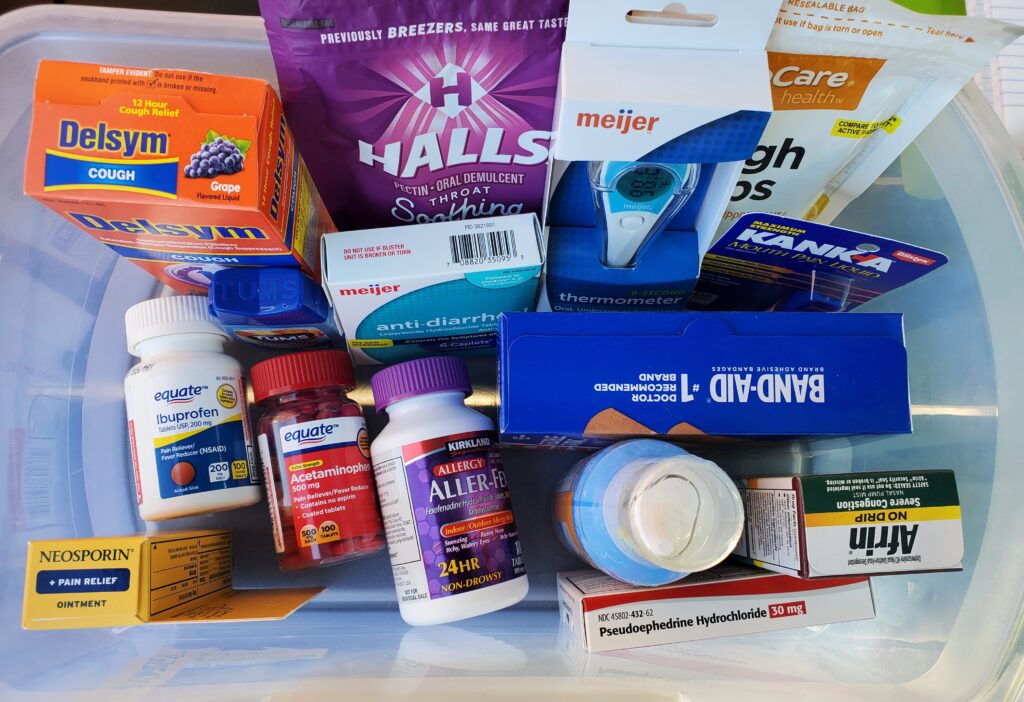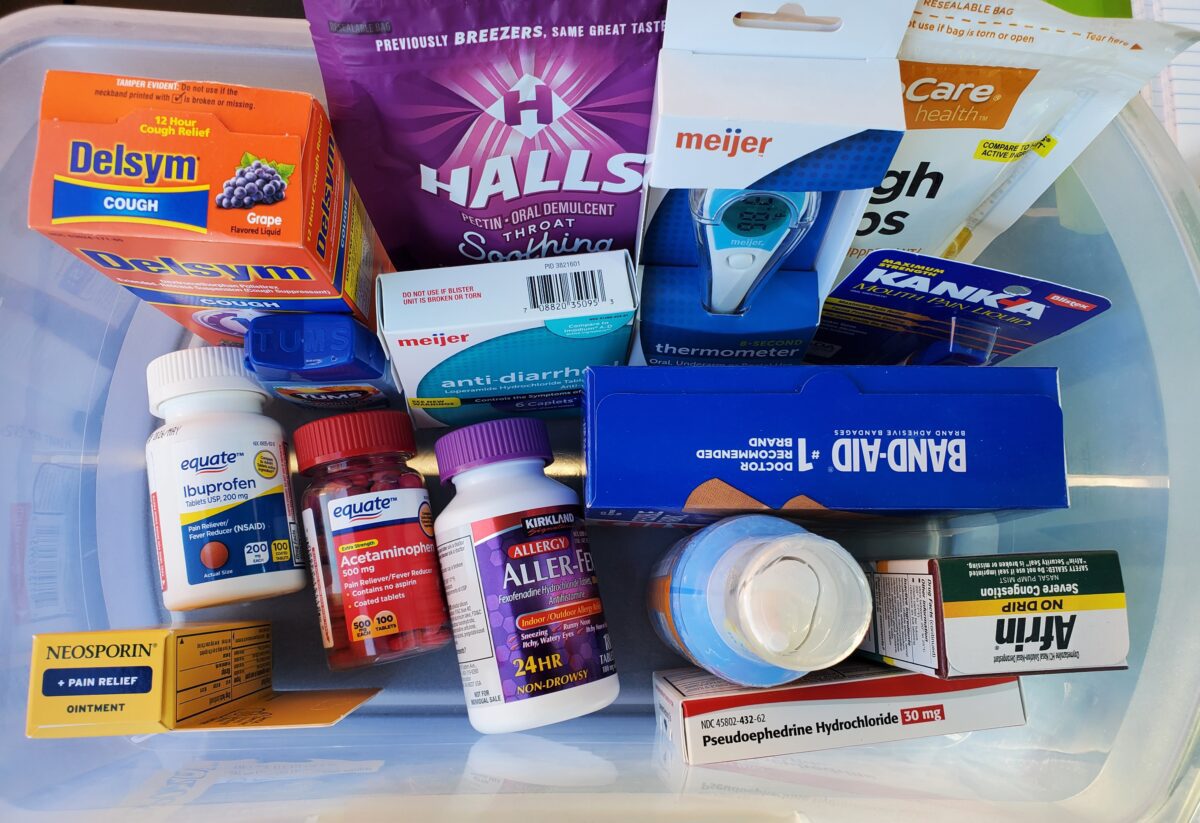
Are you are getting ready to send your teen off to their college dorm? Look no further for some practical pharmacist recommended college dorm medications. These items will make a very helpful medicine and first aid kit. I am a pediatric pharmacist with over 2 decades of experience and I am also a mother of three teens. Obviously I need to caution that I cannot just give blanket recommendations because all medications have some contraindications and potential drug interactions. Always read the product safety information and/or speak directly with your doctor or pharmacist if you are taking other medications or have any health conditions or medication allergies.
Make sure your teen is up to date on immunizations and has a copy of their immunization record and health insurance card. Here is a link to the vaccine recommendations for 19-26 year-olds.
Always send all college dorm medications prescription and non-prescription in the original containers so your teen can read the instructions.
As a pharmacist I usually recommend single ingredient medications. It might save space to include multi-symptom cough and cold medications, but it is not worth the saved space to have you teen taking medications that are not needed. It is also easier to overdose on acetaminophen or ibuprofen with multi-symptom medications. Which is why my pharmacist recommended college dorm medications are nearly all single ingredient medications. I usually buy generic medications because they work just as well as brand name medications. Sometimes I prefer brand name medications due to better flavor.
Which medications should you bring to your college dorm?
Prescribed Medications
Please make sure your teen has all of their prescribed medications and knows how and where to obtain refills. If your teen is going out of state make sure they are still able to obtain refills in that state. All state laws are different, so make sure you have a plan in place ahead of time. Please also make sure your teen is aware of their medication allergies and what their reaction was to the medication. If your teen is taking any prescribed medications or has any medication allergies or health conditions, check with their doctor or pharmacist if any of the other medication listed are still safe to include in their kit.
Pain/Fever medication
Include a small bottle of Ibuprofen (MOTRIN, ADVIL) and/or acetaminophen (TYLENOL). The bottle size depends on how much how much you expect your teen will need. Ibuprofen and acetaminophen are both good choices for pain or fever. They can both provide relief from a sore throat or headache. Ibuprofen is better for menstural cramps, tooth or bone pain, and is also an anti-inflammatory. It would also be a good idea to include a digital thermometer.
Gastrointestinal medications
Heartburn medication. A small bottle of Tums. Even if your teen does not have trouble with heartburn now, they may start to have problems when they get to choose all of their own food for the first time. College meal plans are sometimes all you can eat, including many dessert options. If they use up their supply and request more, that would be a good time to discuss better food choices and smaller meal sizes.
Diarrhea/Constipation medicine. Travel size Imodium. If they make poor food choices or get sick from close living quarters they will love you forever for including medication for diarrhea. This would not be the medication they will want to walk to the nearest pharmacy to obtain. For constipation I recommend better food choices and exercise as first line treatment for occasional constipation. Fruits, veggies, All-bran, prunes, prune juice, more water, and nice walk. If that doesn’t work, and it’s a new problem, it’s probably due to lack of fiber in their diet. Most college students to do not eat enough fiber in their diet. It would not hurt to include a fiber supplement in the medication kit. If they take the fiber supplement, make sure they are staying hydrated.
Hydration. Diarrhea and vomiting can cause dehydration. Including a few packs of Pedialyte or Liquid IV will help if your teen is dehydrated. Staying hydrated can also reduce the risk of constipation. Check out my other post on how to increase your fluid intake.
Cold and flu medications
Nasal Congestion medicine. I recommend including something for allergies and at least one decongestant. Maybe your teen does not suffer from allergies, but could if they move to a new area. I prefer Zyrtec for allergy symptoms, but Claritin and Allegra are also good choices for a non-sedating antihistamine. I would also include a decongestant incase the congestion is from a cold or flu. In this case pseudoephedrine is my first choice. In some states it can only be purchased from a pharmacist. I would also include a bottle of Afrin nasal spray. This can only be used for three days, six doses. It is dosed 1-2 sprays each nostril every 12 hours. It cannot be used for more than 3 days, but it will be three glorious days of breathing through your nose during the worst of any cold or flu.
Cough medicine. For cough in teens and adults it is okay to use Delsym. There are age restrictions on the purchase of Delsym in some states due to abuse potential. This should not be a problem for most college students because the age to purchase is 18. I still think it is the best over the counter option for cough for teens and adults and I am sending a bottle to college with my teen. I would also include cough drops that have menthol as the main ingredient and some that are just soothing throat drops with pectin as the main ingredient. The menthol drops are best for cough suppression. The pectin drops are better for sore or irritated throat, but can also help a bit with cough.
Topical medications
For cuts and scrapes I recommend triple antibiotic ointment and a package of a variety of sizes of Band-Aids.
For itchy rashes a tube of 1% hydrocortisone cream will be a helpful medication to bring to your dorm room.
Canker sores can be brought on by stress, which is why I recommend including Kanka, a topical anesthetic for mouth sores.
Sleep Aids
I prefer non pharmacological treatment as first line for insomnia. I can understand how sleeping in a new place might be a problem due to noise, stress, or just a new environment. Honestly, I used a box fan to block out the noise when I stayed in a dorm. Earplugs are an inexpensive option that might be helpful. A sleep mask might help if your teen is sensitive to light. Good sleep hygiene would be ideal, but if all else fails it wouldn’t hurt to have a small supply of melatonin. I’d recommend 2.5mg or less as a starting dose.
College dorm medication checklist
Disclaimer: Always check with your teen’s doctor or pharmacist if they have any allergies, medical conditions, or are taking any prescribed medications before including these medications in your college dorm medication kit. This section contains affiliate links.
- Prescribed medications
- Acetaminophen (Tylenol)
- Ibuprofen (Motrin, Advil)
- Cough drops (menthol)
- Throat Drops (pectin)
- Tums
- Imodium (loperamide)
- Fiber
- Pedialyte packets
- Non sedating antihistamine (Zyrtec, Claritin or Allegra)
- pseudoephedrine
- Brand name Afrin nasal spray (oxymetazoline)
- Delsym (grape flavor)
- Triple antibiotic ointment
- 1% hydrocortisone cream
- Kanka
- Lubricating eye drops (Artificial Tears – not Visine)
- Melatonin
- Multiple vitamin
- ChapStick
- Sunscreen
- Insect repellant
Basic First Aid Supplies for College Dorm Checklist
- digital thermometer
- Variety of Band-Aids
- Ice Pack
- Scissors
- Tweezers
- Cotton balls/swabs
- Gauze pads
- Medical tape
- Ace bandage
- Tick Key
- Alcohol swabs
- Gloves
Other College Dorm Needs
Check out our other post for what you need to make your dorm your home. This post includes many items we forgot to pack. Be prepared!
As an Amazon Associate, I earn from qualified purchases.



2 replies on “College Dorm Medications – Pharmacist Recommended”
This is very helpful for at home too! Thanks!
Great Information. Thanks.